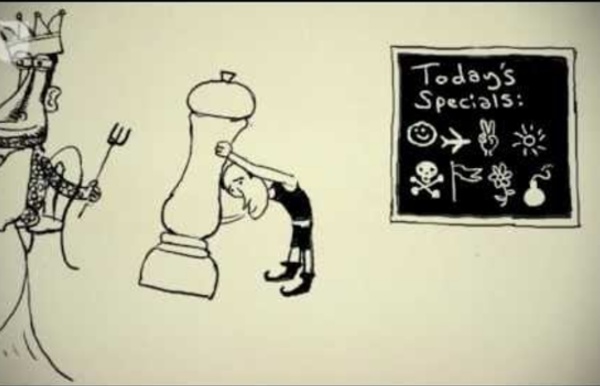



http://www.youtube.com/watch?v=H3r9bOkYW9s
Related: short films and video lessons • APRENDER INGLÉS • AMC : English Language50 ways to use video in the classroom – EFL CLASSROOM 2.0 I will be travelling quite a bit this year to conferences and schools, speaking about a lifelong teaching passion - the use of video as an educational material. It is something I've promoted and developed many language learning ideas around - foremost through my work on EnglishCentral. So enjoy these practical ideas for using this most "real" material with your students, Each idea has a recommended example - just click "View It". Also get this as a lecture presentation with examples HERE. Get all the 50 lists HERE. 50 Ways To Use Video In The Classroom 10 lifesaving websites for ESL teachers Lisa has asked me for some recommendations regarding useful sites for EFL teachers and I’m happy to make a little compilation of the places I visit most often to find ideas, inspirations, betimes lesson plans if I feel exceptionally lazy (The Liberation of the Garden Gnomes by Peter Vahle is just shiny!) and share them with you. So, here we go – my ten favourite websites: Hope you’ll like my choice and give these sites a go. I must admit, my life as a teacher is WAY easier thanks to those wonderful people contributing there, but I also appreciate their influence when I see my own teaching style spiced up with different inspirations and ideas – I feel motivated to change, experiment, develop, to make my classes as interesting as I can. Enjoy the recommendations I’ve shared and if you know some interesting sites, please, share them with me as well.
Language Timeline The English language is a vast flea market of words, handed down, borrowed or created over more than 2000 years. And it is still expanding, changing and trading. Our language is not purely English at all - it is a ragbag of diverse words that have come to our island from all around the world. Words enter the language in all sorts of ways: with invaders, migrants, tradesmen; in stories, artworks, technologies and scientific concepts; with those who hold power, and those who try to overthrow the powerful. View the chart below to get an overview of some of the many chapters in the history of the English language. Celts 500BC-43BC
Eyes All Around « translinguistic other This week on the Harper’s Magazine blog, Scott Horton muses about the philosophical significance of the convex mirror at the vanishing point of Jan Van Eyck’s Arnolfini Portrait. Jan Van Eyck. Detail from the Arnolfini Portrait. Oil on panel, 1434. Sounds Familiar? What you can hear You can listen to 71 sound recordings and over 600 short audio clips chosen from two collections of the British Library Sound Archive: the Survey of English Dialects and the Millennium Memory Bank. You’ll hear Londoners discussing marriage and working life, Welsh teenagers talking with pride about being bilingual and the Aristocracy chatting about country houses. You can explore the links between present-day Geordie and our Anglo-Saxon and Viking past or discover why Northern Irish accents are a rich blend of seventeenth century English and Scots. You can study changes in pronunciation among the middle classes or find out how British Asians express their linguistic identity.
Francis by Richard Hickey Written by novelist & screenwriter Dave Eggars, for the ever-popular radio show This American Life, animated film Francis is the tense tale of the unexplained happenings on a lake in the middle of an Ontario nature preserve. Brought to life by Not to Scale director Richard Hickey and a team of 40 animators, this captivating short perfectly blends the worlds of outstanding production values with engaging storytelling. Her mouth went dry. She held onto each side of the boat, and now she could only wait to see if it happened again.
Video Lesson: Mr. Bean Follow me on twitter This is a video lesson based around the video “Mr. Bean packs his suitcase” thanks to British Council for bringing it to my attention in their lesson plan on making predictions but I’ve adapted it for use in different ways with different levels. Kids and lower levels
Etymology: Languages that have contributed to English vocabulary over time. In Borrowed Words: A History of Loanwords in English, I examine how words borrowed from different languages have influenced English throughout its history. The above feature summarizes some of the main data from the book, focusing on the 14 sources that have given the most words to English, as reflected by the new and revised entries in the Oxford English Dictionary. Using the date buttons at the top of the graphic, you can compare the impact that different languages have made on English over time.